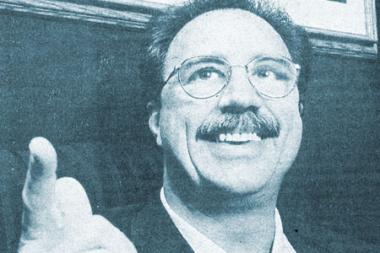When the deregulation of power plant development in Massachusetts opened the field to merchant plants, a new generation of entrepreneurs swarmed in to replace the old regional utility operators. Into Agawam in 1994 came a newcomer, Michael Armitage, who jingled with cash and glittered with connections—connections that enabled him to put together a venture involving El Paso Energy of Texas, Kredietbank of Belgium and Asea Brown Boveri of Switzerland to build a gas-fired power plant.
Soon Armitage was palling around with convicted local mobster Al Bruno and going into business with his son, Springfield restaurateur Victor Bruno (the younger Bruno had no criminal record). Another local tie Armitage formed was with former Springfield City Councilor and attorney Raipher Pellegrino, who did legal work for him—including suing for libel members of a local group called Concerned Citizens and Businesses of Agawam who criticized the proposed plant.
To get land for the plant, Armitage’s company, Power Development, had a dedicated fund of $850,000 to help make unhappy homeowners—and there were several at first—happy to sell out. When the Agawam plant went on line, Armitage used it to build a portfolio that included other projects that were not yet completed, but that he parlayed into a track record that got him $4.2 million in federal money to start an electric bus and battery factory in Pittsfield.
That’s when he overreached.
Today the Agawam plant, Berkshire Power, puts 245 megawatts into the ISO-New England grid.
But Al Bruno is dead, shot to death near the Mt. Carmel Social Club in Springfield in November, 2003. Prosecution of a number of people charged in his murder is going forward in New York, since Bruno was a member of the Genovese crime family.
And Armitage just avoided a trial scheduled for October 25 by pleading guilty to 10 criminal counts, including three counts of tax evasion (including failure to file tax returns from 1993 to 2006 and lying to the IRS); three counts of falsifying information to obtain approximately $1 million in loans from United Bank of West Springfield; one count of false claims and one count of conspiracy (for colluding with others to defraud the Federal Transit Administration of money); one count of making false statements to a federal official; and one count of obstructing a federal audit.
The charges to which Armitage pleaded guilty add up to a pattern of using his energy companies—first Power Development, then Electric Vehicles Worldwide, the Pittsfield firm set up ostensibly to build electric buses and batteries to power electric vehicles—to siphon off money for his own use.
There were signals long ago that Armitage engaged in questionable financial practices. In 1999, he had to repay Power Development more than $1 million that he has misused; about a third had come from checks he had listed in the company’s check register as paid to other parties, but actually written to himself. Yet that same year he received government support to start Electric Vehicles Worldwide.
From November, 2004 through early July, 2006, prosecutors say, Armitage obtained money from the Federal Transit Administration by submitting fictitious or inflated invoices, or claims for expenses that were ineligible for reimbursement. Armitage and his cohorts—the government alleges that he conspired with others to steal from the FTA—also falsely claimed to have completed work on company projects that was designated as “milestone” work and therefore triggered the release of FTA funding. Armitage and “others” cheated the FTA of a total of more than $700,000, according to the prosecution. When the Inspector General of the Department of Transportation, the FTA’s parent agency, initiated an audit, Armitage lied to the auditors, according to the charges.
The maximum penalty for Armitage’s violations is 30 years in prison (for making false statements to a federally insured financial institution). He may also pay up to $6 million in fines and restitution. The plea was made in U.S. District Court in Springfield before Judge Michael Ponsor; representing Armitage were his old Springfield attorney, Raipher Pellegrino, and Charles Dolan. Sentencing has been set for April 7, 2011.



